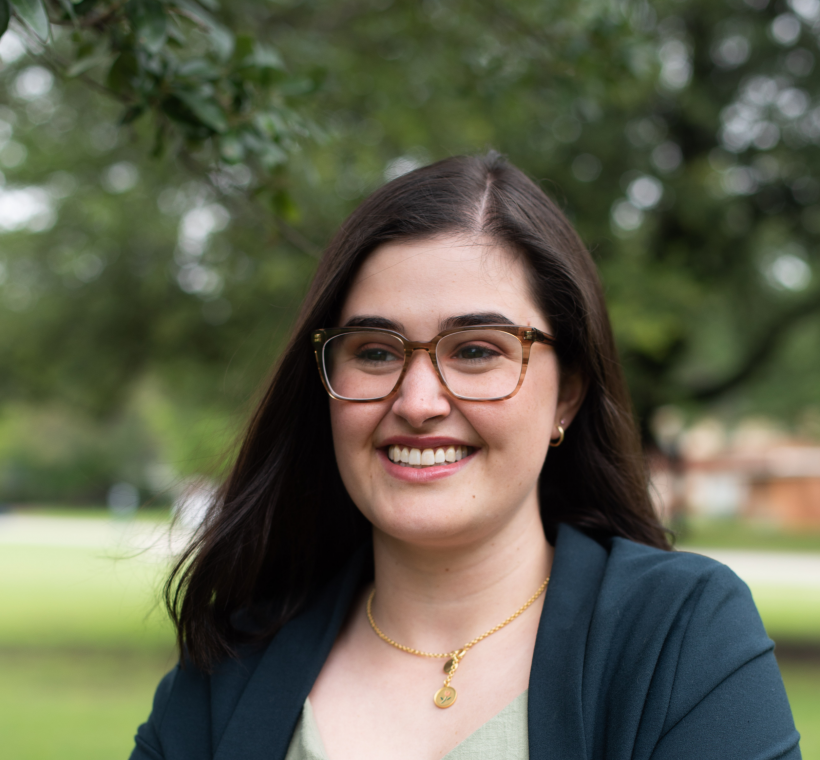
Miranda Suarez
Tell us about yourself:
I’m a general assignment reporter covering the wonderful city of Fort Worth at KERA (the NPR member station that covers North Texas). The station is based in Dallas, so I’m our western outpost, about 45 minutes away.
I moved here a year and a half ago, and since then, I’ve covered a little bit of everything: protests, COVID, legal battles, land development. Fort Worth is one of the fastest growing cities in the country, so there’s a lot to cover, and things are constantly changing.
I’m originally from Massachusetts! I started my audio career at WTBU, Boston University’s student-run radio station. I read the news and hosted a funk & folk music show called Funk Up the Folkdown (still some of my greatest work to this day). I also interned and worked part time at WBUR, where I got to write about grocery store robots and Brown University’s gay pulp fiction collection.
From there, I got the Lee Ester Fellowship at Wisconsin Public Radio, packed my car, moved to Madison and covered general assignment news. That job really solidified my desire to work in audio. Once that fellowship ended, I got the job at KERA, packed my car AGAIN to move down to Texas, and here we are!
A piece of yours or project (in any medium) that you'd like to share.
Earlier this year, a group of North Texas Episcopalians lost their church buildings after a years-long legal battle. It all started with a split in the national church over how LGBTQ people and women get to participate in religious life. I’m proud of this story because I had to catch up on more than a decade of religious and legal conflict, and then capture all the emotion that runs behind it. I’m really grateful to the churchgoers who were so open with me for this story.
What draws you to storytelling?
People in Fort Worth are doing important work. A local artist is spreading awareness of a little-known lynching in the 1920s. The public library is expanding its Spanish language programming. Local activists are working to hold the sheriff’s department accountable. My job is about finding those people doing important work and highlighting it, and that’s what draws me to storytelling.
What excites you the most about being a New Voices Scholar?
So far, I have loved getting to know people I might never have met without this program. I have always been focused on public radio -- specifically working at NPR member stations. So meeting people with totally different careers than mine, but working in audio and doing such cool, creative work, has been amazing.
What’s playing on your radio/audio streaming service right now?
Lately I’ve been really into the podcast This Land. Season 2 just finished, and it digs into how conservative lawyers are trying to dismantle the Indian Child Welfare Act as part of a larger effort to dismantle American Indian tribes. The host, Rebecca Nagle, is really good at bringing the listener into her reporting process, explaining how she made X breakthrough or Y discovery.
What’s the most underrated tool (technical or not) that you use in your creative process?
I rely a lot on the power of a good explanation. Most people will go through their lives and never speak to a journalist, but still, I think we overestimate people’s understanding of our jobs. Before every interview, I take a few minutes to explain why I’m recording, what I want to use the interview for, and where they can find the story when it’s done. It does a lot to help people relax before we start talking on the record.
What is something you want to see more of in the industry?
I want to see more entry-level opportunities in public radio. When I was applying for jobs for the first time a few years ago, these were not easy to find. I started my career in fellowships to get that extra experience boost, and I was lucky to work in some excellent ones (shoutout to Wisconsin Public Radio!). I know not all fellowships are excellent, though, so as long as they exist, I want more of them to be well-paid with either clear hiring expectations at the end, or some training in how to apply for other jobs along the way.
Who/What are your radio/audio inspirations and why?
I grew up listening to WBUR and hearing Meghna Chakrabarti as host of the local news show, Radio Boston. Even as a kid I admired her pointed, thoughtful questions and smart interviews. For the past couple years I’ve also been obsessed with Hansi Lo Wang’s census reporting for NPR. I knew the census was important, but he keeps finding more interesting threads to pull about its impact on literally everything.
Anything else you'd like to add?
Always feel free to reach out and say hi! The best way to reach me is probably through my Twitter DMs. Find me at @MirandaRSuarez.